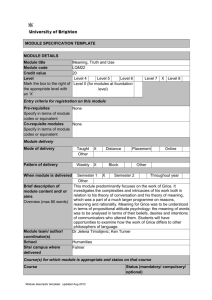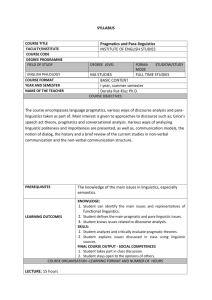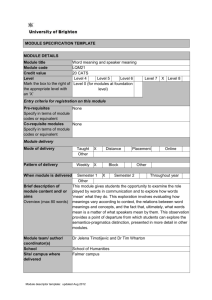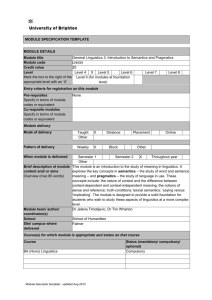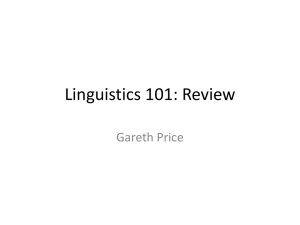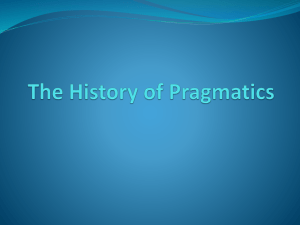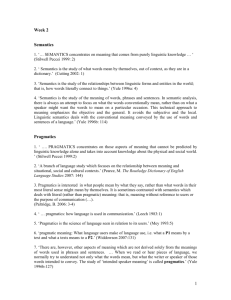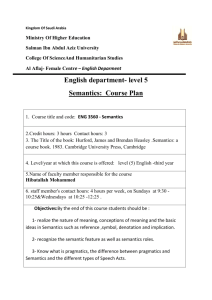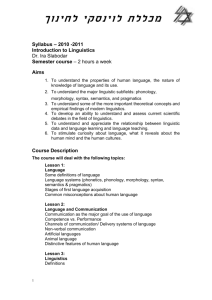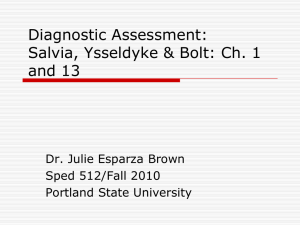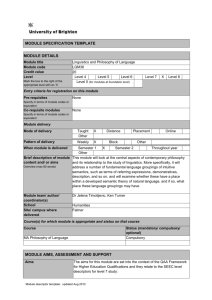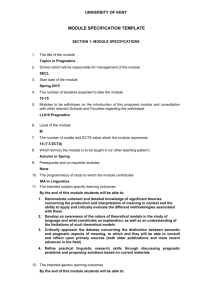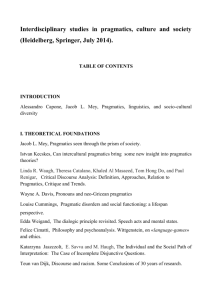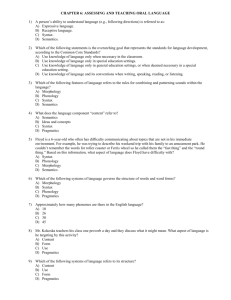module specification template
advertisement
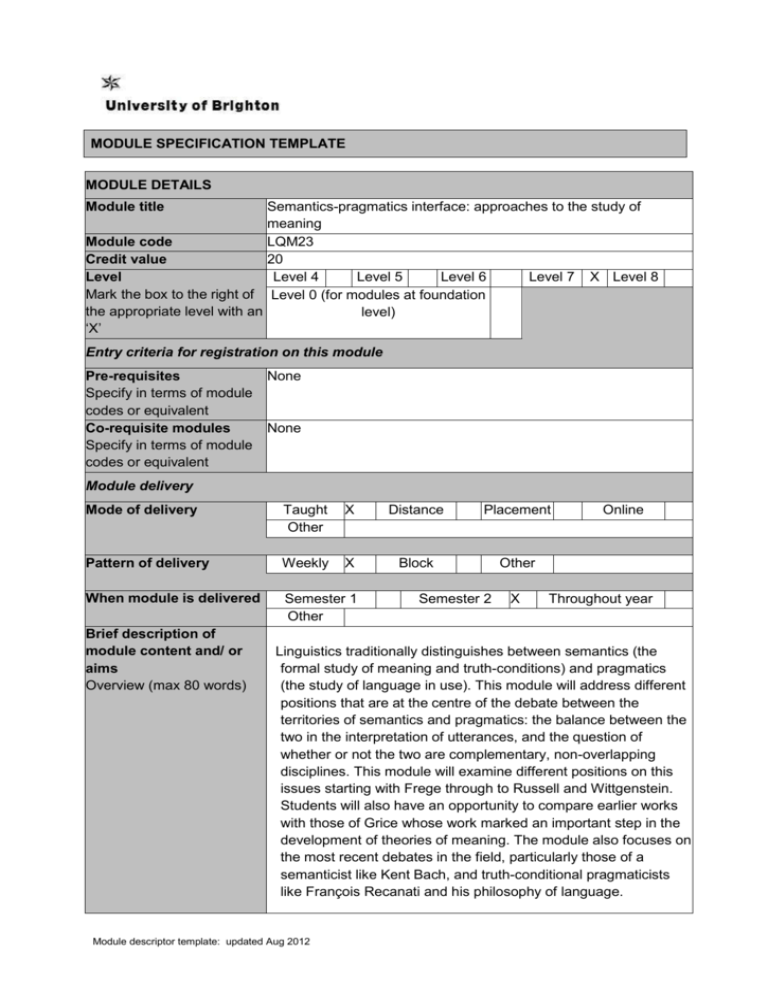
MODULE SPECIFICATION TEMPLATE MODULE DETAILS Module title Semantics-pragmatics interface: approaches to the study of meaning Module code LQM23 Credit value 20 Level Level 4 Level 5 Level 6 Level 7 X Level 8 Mark the box to the right of Level 0 (for modules at foundation the appropriate level with an level) ‘X’ Entry criteria for registration on this module Pre-requisites Specify in terms of module codes or equivalent Co-requisite modules Specify in terms of module codes or equivalent None None Module delivery Mode of delivery Taught Other X Distance Placement Pattern of delivery Weekly X Block Other When module is delivered Semester 1 Other Brief description of module content and/ or aims Overview (max 80 words) Semester 2 X Online Throughout year Linguistics traditionally distinguishes between semantics (the formal study of meaning and truth-conditions) and pragmatics (the study of language in use). This module will address different positions that are at the centre of the debate between the territories of semantics and pragmatics: the balance between the two in the interpretation of utterances, and the question of whether or not the two are complementary, non-overlapping disciplines. This module will examine different positions on this issues starting with Frege through to Russell and Wittgenstein. Students will also have an opportunity to compare earlier works with those of Grice whose work marked an important step in the development of theories of meaning. The module also focuses on the most recent debates in the field, particularly those of a semanticist like Kent Bach, and truth-conditional pragmaticists like François Recanati and his philosophy of language. Module descriptor template: updated Aug 2012 Module team/ author/ coordinator(s) School Site/ campus where delivered Dr Jelena Timotijevic Humanities Falmer Course(s) for which module is appropriate and status on that course Course Status (mandatory/ compulsory/ optional) Compulsory Compulsory Optional Optional MA Linguistics MA Philosophy of Language MRes Linguistics MA English language MODULE AIMS, ASSESSMENT AND SUPPORT Aims The aims for this module are set into the context of the QAA Framework for Higher Education Qualifications and they relate to the SEEC level descriptors for M level study. Learning outcomes Enable students to develop a high level of conceptual understanding of linguistic theories that investigate meaning and use of language Give students an opportunity to develop critical awareness and undertake analysis of complex and contradictory theoretical approaches to studying meaning Examine and critically evaluate how semantics and pragmatics are characterised through a number of approaches to analysing meaning and use of language Develop skills for independent analysis and evaluation, and ability to draw independent conclusions from research in the field In relation to the QAA Framework for Higher Education Qualifications and the SEEC level descriptors for M level study, by the end of the module students should be able to: 1. Demonstrate a critical understanding of complex theoretical concepts used to analyse use and meaning of language 2. Critically evaluate a range of theoretical approaches related to the study of semantics/pragmatics interface 3. Identify and evaluate controversial issues for research in the field 4. Demonstrate originality and autonomy in applying those concepts to the analysis of natural language Content Module descriptor template: updated Aug 2012 Minimalism (the literalist picture), indexicality Relevance Theory Contextualism Truth-conditions Pragmatic processes: saturation and free enrichment Learning support Books: Bach, K. (1999) The semantics-pragmatics distinction: what it is and why it matters. In K. Turner (ed.), The SemanticsPragmatics Interface from different Points of View, (Oxford, Elsevier), 65-84. Bach, K. (2007) Regression in pragmatics (and semantics). In N. Burton-Roberts (ed.), Pragmatics. (Palgrave advances in linguistics), (Basingstoke, Palgrave Macmillan), 24-44. Carston, R. (2004) Relevance Theory and the saying/implicating distinction. In L.R. Horn and G. Ward (eds.), The Handbook of Pragmatics, (Oxford, Blackwell), 633-656. Carston, R. (2007) How many pragmatic systems are there? In M.J. Frápolli (ed.), Saying, Meaning and Referring. Essays on François Recanati’s Philosophy of Language, (Basingstoke, Palgrave Macmillan), 18-48. Cruse, A. (2000) Meaning in Language: an introduction to semantics and pragmatics. Oxford: Oxford University Press. Grice, H.P. (1957) Meaning. Philosophical Review 66, 377-388, reprinted in Grice (1989: 213-223). Grice, H.P. (1989) Studies in the way of words. Harvard: Harvard University Press. Recanati, F. (2004) Literal Meaning. Cambridge: Cambridge University Press. Recanati, F. (2004) Pragmatics and semantics. In L.R. Horn and G. Ward (eds.), The Handbook of Pragmatics, (Oxford, Blackwell), 442-462. Stanley, J. (2002) “Making it articulated”. Mind and Language 17.1 and 3. (Oxford, Blackwell), 149-168. Stanley, J. (2005) Semantics in context. In G. Preyer and G. Peter (eds.), Contextualism in philosophy: knowledge, meaning and truth, (Oxford, Clarendon Press), 221-253. Journals: Journal of Linguistics Journal of Pragmatics Journal of Philosophy Behavioural and Brain Sciences Mind and Language Language Sciences Stanford Encyclopaedia of Philosophy http://plato.stanford.edu/entries/pragmatics/ Pragmatics and speech acts Module descriptor template: updated Aug 2012 http://www.universalteacher.org.uk/lang/pragmatics.htm Teaching and learning activities Details of teaching and learning activities Contact Time: Lectures and tutorials Non-contact Time: Directed reading, Studentcentral Allocation of study hours (indicative) Where 10 credits = 100 learning hours Study hours SCHEDULED This is an indication of the number of hours students can expect to spend in scheduled teaching activities including lectures, seminars, tutorials, project supervision, demonstrations, practical classes and workshops, supervised time in workshops/ studios, fieldwork, external visits, and work-based learning. 20 GUIDED INDEPENDENT STUDY All students are expected to undertake guided independent study which includes wider reading/ practice, follow-up work, the completion of assessment tasks, and revisions. 180 PLACEMENT The placement is a specific type of learning away from the University that is not work-based learning or a year abroad. TOTAL STUDY HOURS 200 Assessment tasks Details of assessment for this module Assessment will be in the context of the University of Brighton Assessment Policy and the Faculty Code of Practice in Assessment, and students will be required to complete the following tasks: Task 1 100% Students submit one essay of 4,000 words which is a critical analysis and evaluation of a particular theoretical approach in analysing meaning in language. The task will be marked on a percentage basis. The module pass mark is 50%. Referral task: Reworking of original task General criteria for assessment are framed by the SEEC descriptors for M level. Against specific criteria, credit will be awarded for: 1. Critical understanding of the nature of the debate Module descriptor template: updated Aug 2012 surrounding issues of interface between semantics and pragmatics (LO1) 2. Critical examination and evaluation of a range of theoretical approaches to analysing meaning and use of language current in the research debate (LO2) 3. Successful defence of a particular theoretical approach and application of insights from the above to the analysis of natural language (LO3, LO4) 4. Critically reflective and autonomous evaluation of the application process above (LO3, LO4) All learning outcomes must be achieved in order to pass the module at the threshold level. Types of assessment task1 Indicative list of summative assessment tasks which lead to the award of credit or which are required for progression. % weighting (or indicate if component is pass/fail) WRITTEN Written exam COURSEWORK Written assignment/ essay, report, dissertation, portfolio, project output, set exercise PRACTICAL Oral assessment and presentation, practical skills assessment, set exercise 100% EXAMINATION INFORMATION Area examination board PG Programme Linguistics and English language Refer to Faculty Office for guidance in completing the following sections External examiners Name Position and institution Date appointed Date tenure ends Prof. Daniel Kadar Professor of Linguistics and English language, Uni. of Huddersfield 1st Jan. 2015 31st Dec. 2019 1 Set exercises, which assess the application of knowledge or analytical, problem-solving or evaluative skills, are included under the type of assessment most appropriate to the particular task. Module descriptor template: updated Aug 2012 QUALITY ASSURANCE Date of first approval Only complete where this is not the first version 2009 Date of last revision Only complete where this is not the first version 2009 Date of approval for this version Version number 2 Modules replaced n/a Specify codes of modules for which this is a replacement Available as free-standing module? Module descriptor template: updated Aug 2012 Yes X No
